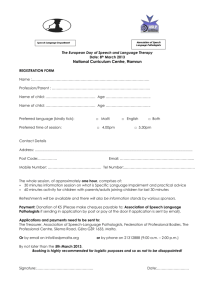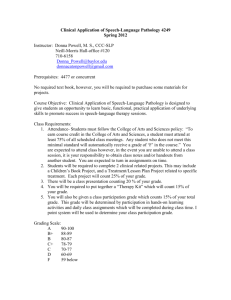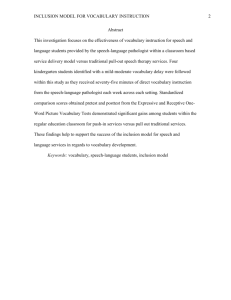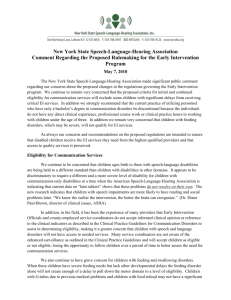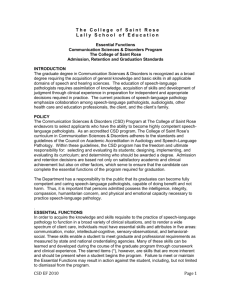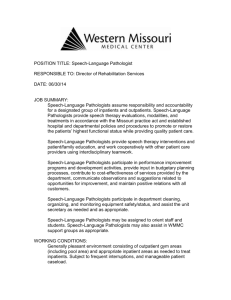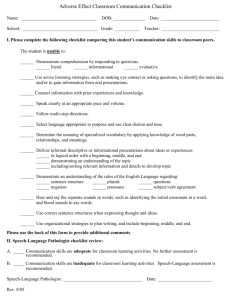Speech-Language Pathology and Audiology
advertisement
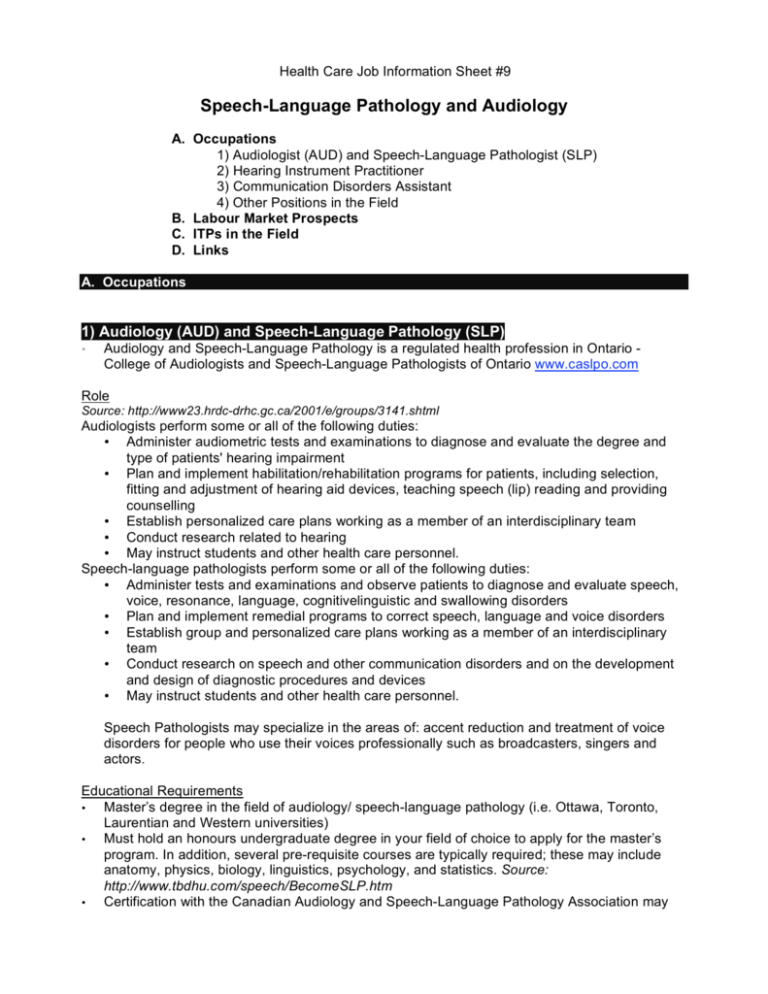
Health Care Job Information Sheet #9 Speech-Language Pathology and Audiology A. Occupations 1) Audiologist (AUD) and Speech-Language Pathologist (SLP) 2) Hearing Instrument Practitioner 3) Communication Disorders Assistant 4) Other Positions in the Field B. Labour Market Prospects C. ITPs in the Field D. Links A. Occupations 1) Audiology (AUD) and Speech-Language Pathology (SLP) • Audiology and Speech-Language Pathology is a regulated health profession in Ontario College of Audiologists and Speech-Language Pathologists of Ontario www.caslpo.com Role Source: http://www23.hrdc-drhc.gc.ca/2001/e/groups/3141.shtml Audiologists perform some or all of the following duties: • Administer audiometric tests and examinations to diagnose and evaluate the degree and type of patients' hearing impairment • Plan and implement habilitation/rehabilitation programs for patients, including selection, fitting and adjustment of hearing aid devices, teaching speech (lip) reading and providing counselling • Establish personalized care plans working as a member of an interdisciplinary team • Conduct research related to hearing • May instruct students and other health care personnel. Speech-language pathologists perform some or all of the following duties: • Administer tests and examinations and observe patients to diagnose and evaluate speech, voice, resonance, language, cognitivelinguistic and swallowing disorders • Plan and implement remedial programs to correct speech, language and voice disorders • Establish group and personalized care plans working as a member of an interdisciplinary team • Conduct research on speech and other communication disorders and on the development and design of diagnostic procedures and devices • May instruct students and other health care personnel. Speech Pathologists may specialize in the areas of: accent reduction and treatment of voice disorders for people who use their voices professionally such as broadcasters, singers and actors. Educational Requirements • Master’s degree in the field of audiology/ speech-language pathology (i.e. Ottawa, Toronto, Laurentian and Western universities) • Must hold an honours undergraduate degree in your field of choice to apply for the master’s program. In addition, several pre-requisite courses are typically required; these may include anatomy, physics, biology, linguistics, psychology, and statistics. Source: http://www.tbdhu.com/speech/BecomeSLP.htm • Certification with the Canadian Audiology and Speech-Language Pathology Association may • be required Register with the College of Audiologists and Speech-Language Pathologists of Ontario Skills/Qualities Technical • Basic computer skills: word processing, internet, email, presentation programs, spreadsheet and database knowledge • Operate diagnostic and therapeutic equipment Communication • Superior oral (very clear speech) and written communication skills • Superior listening skills Other • Good organizational and time-management skill • Sensitivity to patients' health needs • Good skills for dealing with patients and families: tactfulness, motivational skills, patience and perseverance in applying long-term therapy • Flexibility and initiative • A methodical approach and creativity in solving problems • Ability to concentrate and pay close attention to details • Excellent problem recognition and problem solving-skills • Excellent interpersonal skills • Compassion and an interest in caring for others • Ability to work independently and as a member of a team • Interest and aptitude in science and technology • Current knowledge of professional practice issues and standards • Diagnostic skills, medical terminology, analytical thinking • Business and marketing skills – private practice Typical Employers http://www.caslpo.com/english_site/p_hphelp.asp#what Audiologists work in a variety of health and educational settings, including: hospitals, public health units, community health centres, schools, private practice, industrial settings and hearing aid manufacturers. Speech-language pathologists work in a variety of health and educational settings, including: hospitals, public health units, community health centers, schools, children's treatment centers, community care access centers, private practice, preschool settings/daycares, resource centers and facilities for developmentally and/or physically challenged individuals, .offices of physicians, surgeons and dentists, colleges and universities and industry. Average Hourly Wage Source:http://www.labourmarketinformation.ca/standard.asp?ppid=81&lcode=E&prov=35&gaid=9219&occ=3 141&search_key=3&search_type=&employer_potential=&new_search= $ 31.98 (average) $38. 49 (high) $24.23 (low) Salaries vary according to such factors such as experience, level of responsibility, seniority, size of company, size of city, etc. 2) Hearing Instrument Practitioner • Not a regulated profession in Ontario • Registration with the Association of Hearing Instrument Parishioners of Ontario may be required www.ahip.ca Role Source: http://www.ahip.ca/aboutus.htm Hearing Instrument Practitioners provide following services: • Consultation/assessments • Custom fitting • Fabrication of earmolds • Instruction in the maintenance and use of hearing aids • Adjustments/repairs • After-care services • Demonstrations of assistive listening devices For more information on the profession see the following article: http://www.canoe.ca/CareerConnectionNews/040623_health.html Educational Requirements • Three-year community college diploma program. The program is offered by the George Brown College in Ontario. • In the training course at George Brown College in Ontario, http://www.gbrownc.on.ca/Marketing/FTCal/hsci/S117.html students learn theory and skills related to testing hearing, and hearing aid technology and pathology. Most courses involve laboratory experiences. Health promotion strategies are integrated with business management, interviewing and counselling techniques. Skills/Qualities Technical • Basic computer skills: word processing, internet, email; may require spreadsheet and database knowledge, presentation programs • May require specialized knowledge of manufacturers software • Operate and maintain diagnostic and therapeutic equipment Communication • Excellent oral and written communication skills • Excellent listening skills Other • Problem recognition and problem solving-skills • Business management and organizational skills • Ability to multi-task • Ability to work effectively independently and in a team • Excellent interpersonal skills • Committed to customer care • Counseling skills Typical Employers • May be employed by a variety of hearing aid vendors such as audiologists, hearing instrument specialists or other large dispensaries • Work in rehabilitation settings, hospitals, speech and hearing centers and private practice Average Hourly Wage Source: http://www.alis.gov.ab.ca/occinfo $20.50/ hour (average) Salaries vary according to such factors such as experience, level of responsibility, seniority, size of company, size of city, etc. 3) Communication Disorders Assistants • Not a regulated profession in Ontario Role Source: http://www.cdaac.ca/programs.html • • Communication Disorders Assistants (CDA) (also called Communicative Disorders Assistants, Speech-Language Pathology Assistants, or Audiology Assistants) are supportive personnel who work under the supervision of Speech-Language Pathologists or Audiologists Their duties typically include preparing therapy materials for adults and/or children who have communication and/or swallowing disorders, conducting individual and/or group therapy sessions, reporting on therapy outcomes, and carrying out routine maintenance on clinical equipment. Other duties include: • Perform speech, language and hearing screenings • Write progress notes after therapy sessions • Compile statistics on activities completed during the day • Maintain an inventory of supplies and/or equipment Educational Requirements Source: http://www23.hrdc-drhc.gc.ca/2001/e/groups/3235.shtml • • • Twelve to eighteen month college program in communicative disorders or some postsecondary education and on-the-job training Training courses are offered at Durham and Georgian Colleges. See the CDA web site for information: http://www.cdaac.ca/programs.html In some cases CDAs have been trained on the job Skills/Qualities Technical • Basic computer skills: word processing, internet, email, use computer programs in therapy; may require spreadsheet and database knowledge and presentation programs Communication • Excellent oral and written communication skills • Excellent listening skills Other • Programming skills and intervention techniques • Compassion and an interest in caring for others • Strong interpersonal skills • Patience, creativity, flexibility, adaptability • Good observation skills • Ability to follow detailed directions and work as part of a team • • Good organizational and time management skills Experience working with people who have disabilities is an asset Typical Employers Communication disorders assistants work under the supervision of speech-language pathologists and audiologists in a variety of health and educational settings, including: hospitals, public health units, residential institutions, nursing homes, clinics, community health centers, schools, children's treatment centers, community care access centers, specialized rehabilitation centers, daycare centres. and private practice. Average Hourly Wage $18.60/ hour (average) Salaries vary according to such factors such as experience, level of responsibility, seniority, size of company, size of city, etc. 4) Other Positions in the Field of Diagnostics/Therapeutics Intervenor for Deaf-Blind Persons http://www.gbrownc.on.ca/Marketing/FTCal/comsrv/C108.html This program at George Brown College provides the knowledge and basic skills to work with children and adults who are deaf-blind, including individuals who may be medically fragile. Intervenors make it possible for deaf-blind people to access information and to interact within their environment. The program combines theory and practical experience, allowing participants to learn the specialized techniques of intervention including a variety of alternative communication methods. B) Labour Market Prospects Speech Pathologists/ Audiologists Source: excerpted and adapted from http://mb.jobfutures.org/profiles/profile.cfm?noc=3141&lang=en&site=graphic • • • • Employment prospects for Audiologists and Speech-Language Pathologists are expected to be good in the period 2004-2008. This is a small occupational group, and job prospects are largely dependant upon the level of government funding. These services should benefit from the re-investment in Health Care in the early part of the decade. While the number of incremental positions will be limited, job opportunities will arise as a result of turnover. The workforce is predominantly female, which means casual work opportunities are likely to arise when maternity leave is accessed, or when women decide to leave the labour force to raise a family. They are employed in Health Care and Social Assistance (60%) and Educational Services (40%) sectors. For the approximately 145 positions in the Health sector, 44% are in hospitals, 33% in community based offices or clinics and 23% in nursing and residential care facilities. Source: http://www1.on.hrdc-drhc.gc.ca/ojf/ojf.jsp?lang=e&section=Profile&noc=3141 • Employment for this occupation is expected to grow about as fast as the average for all occupations through the year 2007. Currently audiologists and pathologists are experiencing good employment opportunities, given continued employment growth. Employment opportunities should remain good over the forecast period. Growth in elderly population will result in increased numbers of older people with hearing loss requiring audiology services. Source:http://www.hamiltonhealthsciences.ca/careers/upload/file_collection/Healthcare_factsheets_2003.pdf • The need for Speech-Language Pathologists (SLP) is increasing due to the growing population, the lengthening of the life span, advances in medical technology and growing public awareness of the serious problems created by communication and swallowing disorders. Private practice is likely to offer the best opportunities for SLPs at this time as economic constraint in the public sector could lead to fewer employment opportunities in the public health care and educational systems. An increasing number of SLPs are choosing to enter private practice where they may provide services in all clinical areas or may develop expertise in one specialized area. Today’s SLPs are often required to have diverse skill sets, and skills in specialty areas. C) ITPs in the Field Otolaryngologists (ear, nose and throat) bring skills particular to this field. All ITPs have some rehabilitation background. D) Links Educational Institutions • Georgian College http://www.georgianc.on.ca/academics/programs/program_info.php?program=CODA • Durham College https://myplace.durhamcollege.ca/durham/profile/progview.jsp?programID=67 Professional Organizations • Association of Hearing Instrument Practitioners of Ontario www.ahip.ca • The Canadian Hearing Society http://www.chs.ca/services/index.html • Canadian Association of Speech-Language Pathologists and Audiologists http://www.caslpa.ca/ • College of Audiologists & Speech-Language Pathologists of Ontario http://www.caslpo.com/home.html • Communicative Disorders Assistant Association of Canada http://www.cdaac.ca/programs.html Related Web Sites • Ontario Job Futures http://www1.on.hrdc-drhc.gc.ca/ojf/ojf.jsp?lang=e&section=Find&noc=0000#skill3 • Alberta Learning Information Service http://www.alis.gov.ab.ca/occinfo • Manitoba Job Futures http://mb.jobfutures.org/profiles/profile.cfm?noc=3141&lang=en&site=graphic#skills • Speech Language Pathologist Assistant http://192.139.34.242/tap/speech.html
